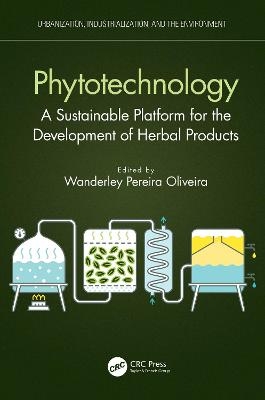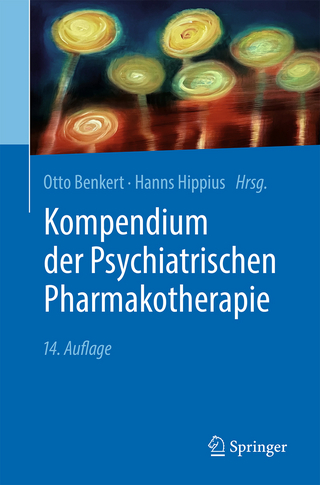
Phytotechnology
CRC Press (Verlag)
978-1-032-12611-1 (ISBN)
Herbal products have traditionally been used in several industrial sectors and have gained a notable reputation in recent years due to the current trend in society, which seeks natural, healthier, and more sustainable products. The processing of these products, however, is multiplex but important for the production of a high-quality standardised product.
Phytotechnology: A Sustainable Platform for the Development of Herbal Products highlights the complex, multidisciplinary process of phytopharmaceutical technology used to create herbal remedies.
Organised into four parts, various experts in the field clearly and objectively address the fundamental and technological concepts involved in the manufacturing of high-quality herbal products.
Additional Features
Emphasises how herbal products have traditionally been used in several industrial sectors, including pharmaceutical science, food, cosmetics, chemical engineering, and agroindustry
Provides a much-needed update of the current information regarding phytopharmaceutical technology and focuses on industrial applications
Written using a multidisciplinary approach, to include all subjects involved in the processing of herbal products
The information presented is valuable reference material for professionals of different specialties who wish to enter this fascinating and innovative area.
Prof. Dr W. P. Oliveira is a Senior Associate Professor at the University of São Paulo/USP. Dr Oliveira received his PhD from the Federal University of São Carlos/UFSCar, working with Spouted Bed Drying of Pastelike Materials (1996), and held a post-doctorate in the Department of Chemical and Biological Engineering at the University of British Columbia/UBC (2006 - 2007), working with Monitoring of Fluid-Particle Systems by Acoustic and Pressure Fluctuation Signals. He is the founder and coordinator of LAPROFAR's group (https://sites.usp.br/laprofar), dedicated to developing basic and applied research in pharmaceutical and phytopharmaceutical processes. Recent projects include drying, coating, agglomeration and microencapsulation of pharmaceuticals, volatile oils and plant extracts; drying and immobilisation of enzymes/proteins. Currently, his research projects have been directed to the study of micro and nanoencapsulation of active phytopharmaceutical ingredients in lipid-based nanosystems, aiming to improve their physicochemical properties, bioavailability and biological activity. His research has been continuously supported by grants from the São Paulo State Research Foundation (FAPESP), the National Council for Scientific and Technological Development (CNPq), and the Coordination for the Improvement of Higher Education Personnel (CAPES), in the form of research funds, infrastructure provision, multiuser equipment grants, and students and research fellowships. He has extensive experience as an advisor of undergraduate, master's, and PhD students, post-doctoral scholars, and industry personnel. He published more than 200 full papers (various in collaboration with groups from Canada, United States, Chile and Portugal), 103 in refereed journals and proceedings, ten book chapters (5 international), 1 Brazilian patent and others 5 pending. Moreover, he has worked as a scientific advisor of national and international funding agencies and journals, organise workshops and conferences, and is a member of the Bioencapsulation Research Group (http://bioencapsulation.net).
Part I General Aspects
Chapter 01 Research and development of herbal medicines: Perspectives and challenges
Chapter 02 Importance of historical records for the development of herbal medicines: The example of COVID-19
Part II Processing Technologies
Chapter 03 Drying of medicinal and aromatic Plants
Chapter 04 Extraction, isolation, and identification of phytopharmaceuticals
Chapter 05 Standardization of herbal extracts by drying technologies
Chapter 06 Drying of phytochemical compositions by spouted bed: An update
Chapter 07 Drying of lipid systems loaded with phytochemicals
Chapter 08 Encapsulation of essential oils in lipid-based nanosystems
Part III Technological Applications
Chapter 09 Plant-based cosmetic products
Chapter 10 Uses of herbal derived products in the food sector
Chapter 11 Essential oils and herbal compounds in the agroindustry
Part IV Regulation Aspects
Chapter 12 Registration of phytomedicines: Technical requirements and highlights on regulation instruments
Chapter 13 Phytopharmacovigilance
| Erscheinungsdatum | 04.01.2022 |
|---|---|
| Reihe/Serie | Urbanization, Industrialization, and the Environment |
| Zusatzinfo | 36 Tables, black and white; 9 Line drawings, color; 44 Line drawings, black and white; 5 Halftones, color; 6 Halftones, black and white; 14 Illustrations, color; 50 Illustrations, black and white |
| Verlagsort | London |
| Sprache | englisch |
| Maße | 156 x 234 mm |
| Gewicht | 860 g |
| Themenwelt | Medizin / Pharmazie ► Medizinische Fachgebiete ► Pharmakologie / Pharmakotherapie |
| Medizin / Pharmazie ► Studium ► 1. Studienabschnitt (Vorklinik) | |
| Naturwissenschaften ► Biologie ► Botanik | |
| Naturwissenschaften ► Chemie ► Organische Chemie | |
| Weitere Fachgebiete ► Land- / Forstwirtschaft / Fischerei | |
| ISBN-10 | 1-032-12611-6 / 1032126116 |
| ISBN-13 | 978-1-032-12611-1 / 9781032126111 |
| Zustand | Neuware |
| Informationen gemäß Produktsicherheitsverordnung (GPSR) | |
| Haben Sie eine Frage zum Produkt? |
aus dem Bereich


